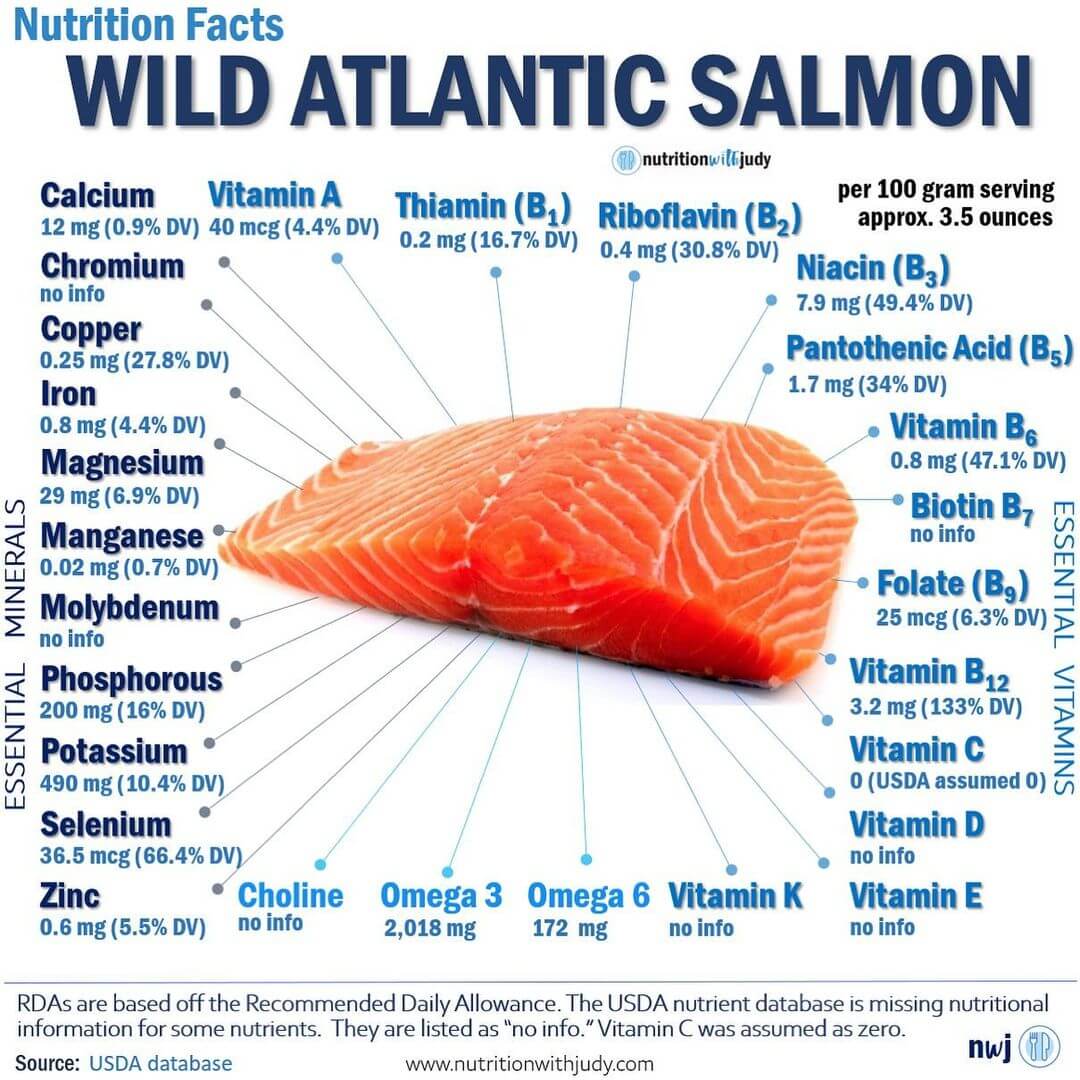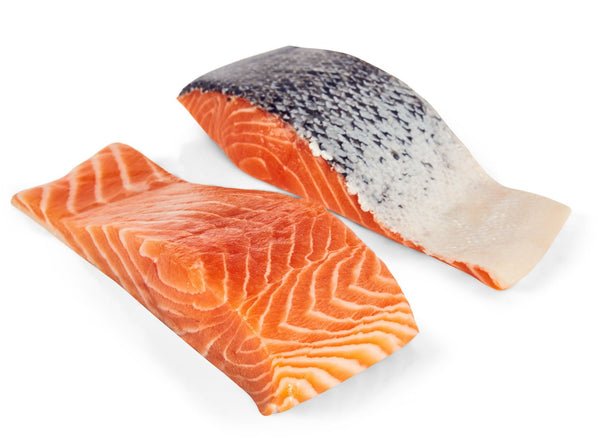Introduction

Protein is an essential macronutrient that plays a crucial role in maintaining overall health and well-being. It is important to include an adequate amount of protein in a balanced diet to support various bodily functions. While there are several sources of protein, salmon stands out as a nutrient-dense option. In addition to being rich in protein, salmon is also packed with other beneficial nutrients, such as omega-3 fatty acids, vitamins, and minerals. In this article, we will explore the protein content in 8 oz of salmon and highlight the health benefits of incorporating this delicious fish into your diet.
Importance Of Protein In A Balanced Diet
Protein is an essential macronutrient that plays a crucial role in maintaining overall health and well-being. It is important to include an adequate amount of protein in a balanced diet to support various bodily functions. Protein helps in repairing and building tissues, producing enzymes and hormones, boosting the immune system, and providing energy. It also aids in the growth and development of muscles, promoting satiety, and maintaining a healthy weight. Including protein-rich foods in your diet can help ensure that you meet your daily nutrient requirements and support optimal health.
Protein Content In Different Food Sources
Protein content varies among different food sources. Here is an overview of the protein content in some commonly consumed foods:
- Chicken breast: Approximately 31 grams of protein per 3.5 ounces (100 grams).
- Eggs: Around 6 grams of protein per large egg.
- Greek yogurt: About 17 grams of protein per 6-ounce (170-gram) serving.
- Lentils: Around 9 grams of protein per half cup (cooked).
- Tofu: Approximately 10 grams of protein per 3.5 ounces (100 grams).
- Quinoa: About 8 grams of protein per cup (cooked).
- Almonds: Around 6 grams of protein per ounce (28 grams).
Including a variety of these protein-rich foods in your diet can help ensure you meet your daily protein needs.
Health Benefits Of Salmon

Salmon offers a multitude of health benefits, making it a valuable addition to any diet. Rich in omega-3 fatty acids, salmon promotes heart health by reducing inflammation and improving cholesterol levels. The high protein content of salmon supports muscle growth and repair, making it an ideal choice for athletes and those looking to build lean muscle. Additionally, salmon is packed with B vitamins, which play a vital role in energy production and brain function. Regular consumption of salmon has also been linked to a reduced risk of chronic diseases such as heart disease, diabetes, and cancer. Incorporating salmon into your diet can contribute to overall health and well-being.
Nutritional Value Of Salmon
Salmon is a highly nutritious food that offers a wide range of essential nutrients. In addition to being a rich source of high-quality protein, salmon is also packed with omega-3 fatty acids, vitamins, and minerals. A 8 oz serving of salmon can provide approximately 23 grams of protein, along with significant amounts of potassium, selenium, vitamin B12, and vitamin D. These nutrients are crucial for various bodily functions, including muscle growth, immune system support, and bone health. Regular consumption of salmon can contribute to a well-rounded and nutrient-dense diet.
Role Of Protein In Supporting Overall Health
Protein plays a crucial role in supporting overall health. It is essential for various functions in the body, such as building and repairing tissues, producing enzymes and hormones, and maintaining a strong immune system. Protein also helps to maintain muscle mass, which is especially important as we age. It provides the building blocks for the synthesis of new muscle proteins and helps to prevent muscle loss. Additionally, protein can contribute to weight management by promoting satiety and reducing cravings. Including an adequate amount of protein in a balanced diet is vital for optimal health and wellbeing.
Protein In 8 Oz Salmon

Protein is an essential nutrient found in significant amounts in salmon. In an 8 oz serving of salmon, there is approximately 44.97 grams of protein. This protein content makes salmon an excellent choice for individuals looking to meet their daily protein needs. Not only is salmon a high-quality source of protein, but it also provides other beneficial nutrients such as omega-3 fatty acids and vitamins. Incorporating 8 oz portions of salmon into your diet can help support muscle growth and repair, enhance satiety, and contribute to overall health and wellbeing.
How Much Protein Is In 8 Oz Of Salmon?
In an 8 oz serving of salmon, there is approximately 44.97 grams of protein. This protein content makes salmon an excellent choice for individuals looking to meet their daily protein needs. Not only is salmon a high-quality source of protein, but it also provides other beneficial nutrients such as omega-3 fatty acids and vitamins. Incorporating 8 oz portions of salmon into your diet can help support muscle growth and repair, enhance satiety, and contribute to overall health and wellbeing.
Comparing Protein Content Of Different Salmon Portions
When comparing the protein content of different salmon portions, it’s important to consider the cut and serving size. A 3.5-ounce serving of salmon fillet contains approximately 22 grams of protein, while a salmon steak of the same size provides around 20 grams. Salmon side portions offer a slightly higher protein content, with approximately 23.6 grams per 100 grams. Additionally, salmon sashimi can contain anywhere between 20-25 grams of protein per 100 grams serving. These variations in protein content among different salmon portions provide options for individuals to choose based on their protein needs and preferences.
Protein Quality And Absorption

Salmon is known for its high-quality protein content. It provides all the essential amino acids that the body needs for proper growth, repair, and maintenance of tissues. The protein in salmon is highly bioavailable, meaning that it is easily absorbed and utilized by the body. This makes it an ideal protein source for promoting muscle development and recovery. The amino acids in salmon are also beneficial for supporting immune function and hormone production. The combination of high-quality protein and excellent absorption makes salmon an excellent choice for meeting your protein needs.
High-quality Protein In Salmon
Salmon is renowned for its high-quality protein content. It contains all the essential amino acids that the body needs for proper growth, repair, and maintenance of tissues. The protein in salmon is considered high-quality because it is easily digested and absorbed by the body. This means that the amino acids in salmon are readily available for muscle development, recovery, and overall health. Additionally, the protein in salmon is beneficial for supporting immune function and hormone production. By including salmon in your diet, you can ensure that you are consuming a high-quality protein source that promotes optimal health and wellbeing. [19]
Protein Absorption And Utilization By The Body
Protein absorption and utilization by the body is a complex process that involves digestion, absorption, and transportation of amino acids to various tissues and organs. After consumption, proteins are broken down into amino acids in the stomach and small intestine. These amino acids are then absorbed into the bloodstream and transported to cells throughout the body. Once inside the cells, amino acids are used for various purposes such as muscle growth and repair, enzyme production, and hormone synthesis. The body relies on a steady supply of high-quality protein, like that found in salmon, to support optimal functioning and overall health.
Other Nutrients In Salmon

Salmon is not only a rich source of protein, but it also provides a variety of other important nutrients. One notable nutrient found in salmon is omega-3 fatty acids, which are essential for brain health and reducing inflammation in the body. Additionally, salmon is known for its high levels of B vitamins, such as B12 and niacin, which play a crucial role in metabolism and energy production. Moreover, salmon contains minerals like selenium and potassium, which are essential for maintaining proper bodily functions. Including salmon in your diet can help ensure that you are getting a wide range of beneficial nutrients that support overall health.
[24]
Omega-3 Fatty Acids In Salmon
Salmon is known for its high content of omega-3 fatty acids, particularly EPA (eicosapentaenoic acid) and DHA (docosahexaenoic acid). These fatty acids are essential for brain health, reducing inflammation in the body, and supporting heart health. Omega-3 fatty acids have been shown to have numerous benefits, including improving cognitive function, reducing the risk of heart disease, and decreasing inflammation in conditions such as arthritis. Including salmon in your diet can help you meet your omega-3 fatty acid needs and support overall health.
Vitamin And Mineral Content Of Salmon
Salmon is not only a great source of protein but also provides various essential vitamins and minerals. It is particularly rich in several B-vitamins, including vitamin B12, vitamin B6, and niacin, which are important for energy production and brain function. Additionally, salmon is a good source of minerals such as selenium, potassium, and magnesium, which play a role in maintaining healthy bodily functions. The omega-3 fatty acids present in salmon also contribute to overall heart health and can reduce the risk of chronic diseases. Adding salmon to your diet can help you meet your vitamin and mineral needs and support optimal health.
Conclusion

Incorporating salmon into a protein-rich diet can provide numerous health benefits. With its high protein content and abundance of omega-3 fatty acids, salmon is an excellent choice for those looking to support their overall well-being. A single 8 oz serving of salmon contains approximately 45 grams of protein, making it a substantial source of this essential nutrient. However, it’s important to be mindful of portion sizes to avoid consuming excessive calories. Including salmon in your meals can offer a nutritional boost and contribute to a balanced diet. So, go ahead and enjoy the protein-rich goodness that salmon has to offer.
Incorporating Salmon Into A Protein-rich Diet
Including salmon in a protein-rich diet is a great way to boost your overall protein intake. With its high protein content and abundance of omega-3 fatty acids, salmon offers numerous health benefits. To incorporate salmon into your diet, you can try various preparations such as grilling, baking, or pan-searing. Pair it with a side of steamed vegetables or a salad for a well-balanced meal. Aim to have at least 2 servings of salmon per week to meet your nutrient needs and support your overall health. Consider adding salmon to your meal plan and enjoy the delicious and nutritious benefits it provides.
Final Thoughts On The Protein Content In 8 Oz Salmon Portions
Incorporating 8 oz salmon portions into a balanced diet can provide a significant protein boost. With approximately 23 grams of protein per serving, salmon is an excellent protein source for those looking to support muscle growth and maintenance. Its high-quality protein content, combined with its omega-3 fatty acids and other essential nutrients, makes salmon a nutritious choice. Whether grilled, baked, or pan-seared, adding salmon to your meals can not only enhance the flavor but also provide the protein your body needs for optimal health. So, go ahead and enjoy the protein-rich benefits of salmon in your diet.
Frequently Asked Questions – How Much Protein in 8 oz Salmon
Q: How much protein is typically found in 8 oz of salmon?
A: An 8 oz serving of salmon contains approximately 46 grams of protein.
Q: Is this amount of protein in salmon beneficial for a healthy diet?
A: Yes, consuming 8 oz of salmon provides a substantial amount of protein necessary for a healthy diet. Protein is an essential macronutrient that plays a crucial role in muscle repair, tissue growth, and various physiological processes in the body.
Q: Are there any other nutrients found in salmon besides protein?
A: Absolutely! Salmon is an excellent source of omega-3 fatty acids, vitamin D, vitamin B12, selenium, and other essential nutrients. These nutrients contribute to overall health and well-being.
Q: How does the protein content in salmon compare to other common protein sources?
A: Salmon is considered a protein-rich food. In fact, its protein content is higher compared to many other protein sources, such as chicken, beef, and tofu.
Q: Is it necessary to consume all 8 oz of salmon in one serving to benefit from its protein content?
A: Not necessarily. While an 8 oz serving of salmon provides a substantial amount of protein, you can still benefit from consuming smaller portions. It’s important to consider your overall protein intake throughout the day and make sure it aligns with your dietary needs.
Q: Can the protein content vary in different types of salmon?
A: The protein content may vary slightly depending on the species and the way the salmon is prepared. However, on average, an 8 oz serving of most salmon varieties contains around 46 grams of protein.
Q: How can I incorporate 8 oz of salmon into my meals?
A: There are various delicious ways to incorporate 8 oz of salmon into your meals. Grilling, baking, or pan-searing salmon with your favorite spices and herbs is a popular option. You can also include salmon in salads, wraps, stir-fries, or as a topping for whole grain dishes.
Q: Can I consume salmon if I am following a vegetarian or vegan diet?
A: No, salmon is not suitable for those following vegetarian or vegan diets as it is a type of animal protein. However, there are many plant-based protein sources available for individuals following such diets, including legumes, tofu, tempeh, seitan, and plant-based protein powders.
In summary, an 8 oz serving of salmon contains approximately 46 grams of protein. This protein content, along with its other valuable nutrients, makes salmon a healthy and versatile protein source that can be enjoyed in various delicious ways in your meals.

A small, independently run fish and chip shop using quality ingredients cooked freshly in our kitchen to ensure great tasting food. All of our drinks are in glass bottles, and all of our takeaway packaging is recyclable or compostable to help reduce our impact on the environment.